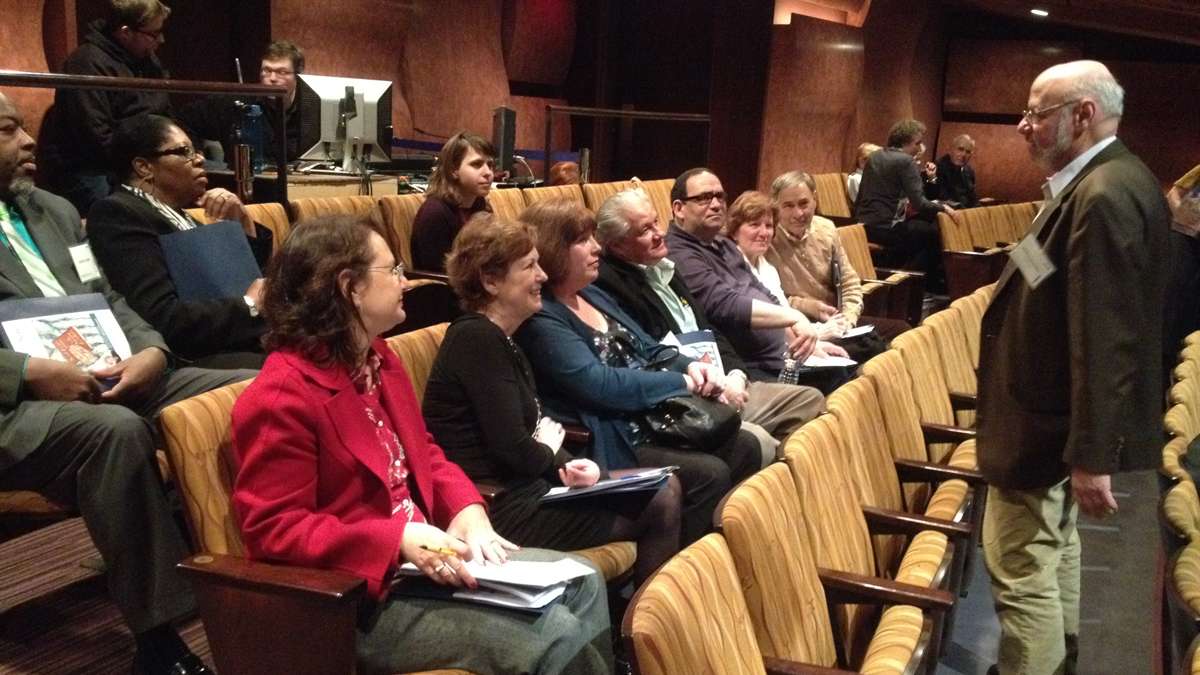Reviews: ‘Mothers and Sons’ — and Everyone’s a Critic
Accompanying Howard Shapiro’s review, we also present the reviews of three audience members who attended Wednesday’s opening-night performance with him at a WHYY/NewsWorks event called “Everyone’s A Critic.”
A NOTE TO READERS: Following Howard Shapiro’s review below you’ll find the reviews of three audience members from a group that came to Wednesday’s opening night with him at a WHYY/NewsWorks event called “Everyone’s A Critic.” The group talked about theater criticism before the show, and Howie invited them afterward to write about their impressions — as he does.
—
It’s not often that two opposite sides of an argument hold equal force in a play. We’re more comfortable with conflict between someone who’s obviously right and someone who isn’t. So it’s all the more impressive that Philadelphia Theatre Company’s production of Terrence McNally’s terrific “Mothers and Sons” forces you to understand the pain of two characters with clashing value systems: in one corner, a loveless mother who refuses to believe her dead son was gay, and in the other, the man he loved.
The mother is Katharine, played by Michael Learned (from TV’s “Nurse” and “The Waltons”) with a face that very subtly suggests rancor and a delivery that that sometimes reveals it. The former lover, crushed to pieces when Katharine’s son died of complications from AIDS, is Cal. In James Lloyd Reynold’s portrayal, he is civil and guarded but not about to be overrun. The two are suddenly thrown together when Katharine comes to Cal’s apartment, a surprise visit. Talk about awkward.
What plays out is a fragile conversation that McNally, a four-time Tony-winning playwright, handles like a journalist laying out two complete — and completely different — sides of the same story. Wendy C. Goldberg’s production at Philadelphia Theatre Company raises the bar: Under her direction, these characters are straight-forward without even a whiff of posturing. And neither wavers.
What you get is a “Mothers and Sons” with hot, pumping blood and bursts of deep anger running through it. There was less open anger when the play had its world premiere two summers back at Bucks County Playhouse in New Hope, then in a Broadway production last year, both with Tyne Daly in the role of the mother. With essentially the same script, the play was compelling in a funnier, calmer way — an awkward situation still, but not a tinderbox.
At Philadelphia Theatre Company, you get the constant feeling that it’s about to explode.
This “Mothers and Sons” is bracing and urgent and unquestionably real, a production that honors McNally from the theater company that premiered his “Master Class” (which went on to win the best-play Tony Award) as well as several other McNally works.
“Mothers and Sons” is the sequel to a TV play he wrote — “Andre’s Mother,” aired on PBS in 1990. (You needn’t have any familiarity with it to appreciate “Mothers and Sons,” and in fact, I’ve never seen it.) The teleplay involved Katharine, a woman from Dallas who could not accept her son Andre as a gay man, or his AIDS-related death, or his partner Cal.
Fast forward to the present, about a quarter-century later, and Katherine drops in unannounced to Cal in New York; she wants to drop off something of Andre’s she’d been keeping. She hasn’t seen Cal since the memorial service for her son, and plenty has changed — Cal is now a married man with a husband (played by Hugh Kennedy, who ups the ante for tension) and a 6-year-old son (the endearing Jacob Wilner on opening night Wednesday, alternating with Patrick Gibbons, Jr.).
A lot more has changed, nationally. Cal now lives in a state where the law allows him to marry another man. Being gay has largely shed its stigma. AIDS remains a dreaded danger, but not a sure-fire death sentence.
For Cal and his husband, the years have changed their notion of who they can be. For Katharine, those benefits are liabilities. Somehow, her son was murdered. Somehow, the murderers became respectable. In the back-and-forth McNally creates, he covers a lot of history without ever having to detail it. And he covers a lot of emotional territory for his characters, from acceptance and denial to vengeance and redemption.
At one point, Katharine stands at a window in the apartment — a splendid living room designed by John Arnone — and watches the light fade over Manhattan. “It goes from day to night before you realize there’s no transition,” she says, in a play that shows just what transition means.
“Mothers and Sons,” produced by Philadelphia Theatre Company, runs though March 6 at the Suzanne Roberts Theatre, Broad and Lombard Streets. 215-985-0420 or www.philadelphiatheatrecompany.org.
—
By Denise Portner
When a play is called “Mothers and Sons,” one expects an exploration of universal themes. Yet upon learning that Terrence McNally’s Tony-nominated work deals with the relationship between a mother and her late son’s partner, his husband and their young son, I wondered just how much this mother would find familiar.
In a word? Plenty.
First, there’s the issue of being taken for granted. Katharine Gerard, a woman of a certain age, fully realized by the accomplished Michael Learned, has schlepped her son Andre, an aspiring actor, to lessons during his youth, doting on him, her only child. And what is her reward? He runs off to New York into the embrace of other young men, leaving her to a dissatisfying marriage in Texas, far from her roots in New York.
Of course, it is Katharine’s decision to cut off communications with Andre as he pursues a lifestyle far different from what she had imagined for him, in Manhattan, ignoring him even as he suffers the throes of AIDS. Twenty years after his death at 29, having recently been widowed, soaked in grief, anger and regret, she wonders what life has left to offer. Clutching a diary of Andre’s that she has yet to read, she embarks on a trip to Manhattan — for what?
And herein lies the ultimate force to which anyone in the audience can relate: the longing for connection. Finding herself alone in the world, Katharine dons her mink coat, heads north, and arrives unannounced to see where an encounter with Andre’s former partner will take her.
In an incisive choice, McNally sets the scene in December on the shortest day of the year. The mood is grim, and Katharine laments that day turns into night before you know it, without transition. We’re not ready for the turns life takes. We aren’t in control of the choices our sons — or others — make. We can’t hold back the sun from setting.
James Lloyd Reynolds as Cal, the partner who cared for Andre during his illness, embodies the weight of the loss he has borne even as he has moved on to a life with a man he has been able to marry and a son they have been able to conceive. Husband Will (played with charm and accessibility by Hugh Kennedy) is 15 years younger, unburdened by witnessing the agony of the AIDS epidemic in the gay community in the 1980s and ’90s. It’s a new day in 2014. AIDS is manageable; marriage and children are possible. The young, ebullient Bud (this evening played by the delightful Jacob Wilner) is beloved by his Papi and Papa.
Kudos to director Wendy C. Goldberg, who extracts the universal from the script, in staging that remains dynamic. She bring forth moments of tension and catharsis that feel organic. The set, a soaring-ceiling apartment on the West Side, nicely appointed but child-friendly, is just right, and the use of a few softly projected slides to show the photos Katharine is viewing is a clever touch.
Thankfully, “Mothers and Sons” doesn’t preach. It does, however, give voice to four characters who are remarkably strong and forthright. And it covers a wide swath of human experience in 90 minutes with remarkable clarity. We’re not always in favor of the decisions our sons — or daughters or parents — make. And their choices might call up disappointment or anger that are, in fact, completely our own. But our decision whether to pursue or reject love — and in the face of pain and loneliness — is a compelling human drive.
—
By Annemarie Ervin
I enjoyed the play, and I felt that the actors did a good job portraying the desperation of their characters. The setting was a little drab, but I did notice the symbolism of starting in darkness and, as the mother’s character revealed more about her life and her feelings, the stage lighting becoming brighter.
My first thought at the end of the play was: Wow, I didn’t think people still felt that way about gay people. However, after I thought about it, this play really didn’t have to be about gay issues at all — any issue could have played opposite the story of a woman’s loneliness and her longing for love as she looked for it from everyone else but herself.
While I did enjoy the play, I felt a little overwhelmed at times. There were so many issues and messages, I didn’t really know what I was supposed to take with me. Was this play about the desperation of women who lived in loveless relationships, people who looked for love from anyone but themselves, people who could not forgive? Or was it about the acceptance of the gay and lesbian community? Regardless, people will see this play for whatever message they are looking to get from it. We can ask, then, if Mr. McNally intended the confusion, so that everyone would take their own message from the play.
By Barbara White-Curry
Philadelphia Theater Company’s production of “Mothers and Sons” by Terrence McNally featured Michael Learned as the main character in the play. It was a great performance by all and there wasn’t a bad seat, as you could see and hear the actors clearly from wherever you were seated in the house.
I am a mother of sons so I could understand her pain and what she was feeling. She was tormented with guilt for not understanding why her son had chosen to live his life the way that he did. I felt It was a true test of family and forgiveness.
The play dealt with the AIDS epidemic and showed how gay men are now being allowed to marry and raise a family. I think she finally realized that it was the illness and not her son’s lover who had taken him away from her.
As time went on, it seems this aging mother was lonely and just needed some fulfillment in her life after both her son and husband had passed away. It was as if she started to come to life after meeting the youngest character “Bud” and realized life had a purpose.
The set started out a bit dark, but I believe that was to set the mood. It did end up brighter — brighter with the hope that we all are put on this earth to love, teach and be an example to others!
WHYY is your source for fact-based, in-depth journalism and information. As a nonprofit organization, we rely on financial support from readers like you. Please give today.











